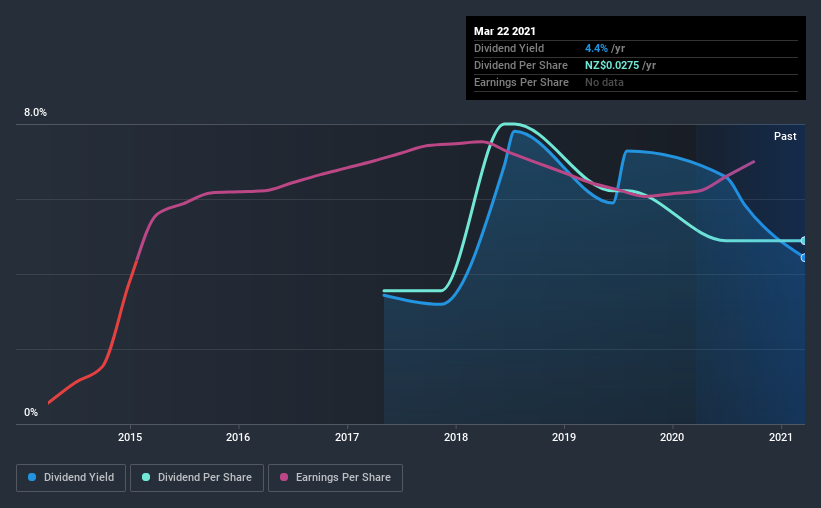- New Zealand
- /
- Consumer Finance
- /
- NZSE:GFL
Does Geneva Finance Limited (NZSE:GFL) Have A Place In Your Dividend Portfolio?

Dividend paying stocks like Geneva Finance Limited (NZSE:GFL) tend to be popular with investors, and for good reason - some research suggests a significant amount of all stock market returns come from reinvested dividends. On the other hand, investors have been known to buy a stock because of its yield, and then lose money if the company's dividend doesn't live up to expectations.
In this case, Geneva Finance likely looks attractive to dividend investors, given its 4.4% dividend yield and four-year payment history. It sure looks interesting on these metrics - but there's always more to the story. Some simple research can reduce the risk of buying Geneva Finance for its dividend - read on to learn more.
Explore this interactive chart for our latest analysis on Geneva Finance!

Payout ratios
Companies (usually) pay dividends out of their earnings. If a company is paying more than it earns, the dividend might have to be cut. So we need to form a view on if a company's dividend is sustainable, relative to its net profit after tax. Geneva Finance paid out 38% of its profit as dividends, over the trailing twelve month period. This is a middling range that strikes a nice balance between paying dividends to shareholders, and retaining enough earnings to invest in future growth. One of the risks is that management reinvests the retained capital poorly instead of paying a higher dividend.
Remember, you can always get a snapshot of Geneva Finance's latest financial position, by checking our visualisation of its financial health.
Dividend Volatility
One of the major risks of relying on dividend income, is the potential for a company to struggle financially and cut its dividend. Not only is your income cut, but the value of your investment declines as well - nasty. Looking at the data, we can see that Geneva Finance has been paying a dividend for the past four years. It has only been paying dividends for a few short years, and the dividend has already been cut at least once. This is one income stream we're not ready to live on. During the past four-year period, the first annual payment was NZ$0.02 in 2017, compared to NZ$0.03 last year. This works out to be a compound annual growth rate (CAGR) of approximately 8.3% a year over that time. The dividends haven't grown at precisely 8.3% every year, but this is a useful way to average out the historical rate of growth.
It's good to see the dividend growing at a decent rate, but the dividend has been cut at least once in the past. Geneva Finance might have put its house in order since then, but we remain cautious.
Dividend Growth Potential
With a relatively unstable dividend, it's even more important to evaluate if earnings per share (EPS) are growing - it's not worth taking the risk on a dividend getting cut, unless you might be rewarded with larger dividends in future. Earnings have grown at around 7.9% a year for the past five years, which is better than seeing them shrink! It's good to see decent earnings growth and a low payout ratio. Companies with these characteristics often display the fastest dividend growth over the long term - assuming earnings can be maintained, of course.
Conclusion
To summarise, shareholders should always check that Geneva Finance's dividends are affordable, that its dividend payments are relatively stable, and that it has decent prospects for growing its earnings and dividend. Firstly, we like that Geneva Finance has a low and conservative payout ratio. Unfortunately, earnings growth has also been mediocre, and the company has cut its dividend at least once in the past. Geneva Finance might not be a bad business, but it doesn't show all of the characteristics we look for in a dividend stock.
Companies possessing a stable dividend policy will likely enjoy greater investor interest than those suffering from a more inconsistent approach. However, there are other things to consider for investors when analysing stock performance. Case in point: We've spotted 3 warning signs for Geneva Finance (of which 1 is significant!) you should know about.
If you are a dividend investor, you might also want to look at our curated list of dividend stocks yielding above 3%.
If you’re looking to trade Geneva Finance, open an account with the lowest-cost* platform trusted by professionals, Interactive Brokers. Their clients from over 200 countries and territories trade stocks, options, futures, forex, bonds and funds worldwide from a single integrated account. Promoted
New: Manage All Your Stock Portfolios in One Place
We've created the ultimate portfolio companion for stock investors, and it's free.
• Connect an unlimited number of Portfolios and see your total in one currency
• Be alerted to new Warning Signs or Risks via email or mobile
• Track the Fair Value of your stocks
This article by Simply Wall St is general in nature. It does not constitute a recommendation to buy or sell any stock, and does not take account of your objectives, or your financial situation. We aim to bring you long-term focused analysis driven by fundamental data. Note that our analysis may not factor in the latest price-sensitive company announcements or qualitative material. Simply Wall St has no position in any stocks mentioned.
*Interactive Brokers Rated Lowest Cost Broker by StockBrokers.com Annual Online Review 2020
Have feedback on this article? Concerned about the content? Get in touch with us directly. Alternatively, email editorial-team (at) simplywallst.com.
About NZSE:GFL
Geneva Finance
Geneva Finance Limited lends money to individuals, companies, and other entities primarily in New Zealand and Tonga.
Medium and good value.
Market Insights
Community Narratives




